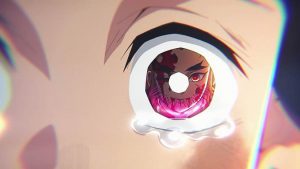 I don’t really know what to call this post. Is it a “First Impressions” when it happens in the middle of an anime season, coming on the heels of another episode of the same series? Kimetsu no Yaiba has pretty well discarded the usual precedents of anime broadcast with this weird return to the airwaves, but I guess that’s fitting. This is a franchise that’s re-invented a lot of things where anime and manga are concerned – on the commercial side, that is, not the creative – so there’s no reason for it to feel bound by those precedents.
I don’t really know what to call this post. Is it a “First Impressions” when it happens in the middle of an anime season, coming on the heels of another episode of the same series? Kimetsu no Yaiba has pretty well discarded the usual precedents of anime broadcast with this weird return to the airwaves, but I guess that’s fitting. This is a franchise that’s re-invented a lot of things where anime and manga are concerned – on the commercial side, that is, not the creative – so there’s no reason for it to feel bound by those precedents.
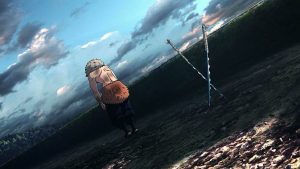 I continue to be in sort of a weird place myself, with a fairly lengthy gap in my own timeline with the series which I just haven’t had the time (and to an extent the inclination, if I’m honest) to fill in. Mugen Ressha-hen helped, but there are still blank spots – like, I have no idea how Muzan (yay that he’s back, BTW) ended up in a little boy’s body. And I don’t know who I’m assumed to recognize and who’s a new character. But Kimetsu isn’t War and Peace or even Hunter X Hunter – its strengths lie in delivering the expected very well rather than in subverting expectations – so I kind of feel like I can extrapolate a lot of this out and come pretty close.
I continue to be in sort of a weird place myself, with a fairly lengthy gap in my own timeline with the series which I just haven’t had the time (and to an extent the inclination, if I’m honest) to fill in. Mugen Ressha-hen helped, but there are still blank spots – like, I have no idea how Muzan (yay that he’s back, BTW) ended up in a little boy’s body. And I don’t know who I’m assumed to recognize and who’s a new character. But Kimetsu isn’t War and Peace or even Hunter X Hunter – its strengths lie in delivering the expected very well rather than in subverting expectations – so I kind of feel like I can extrapolate a lot of this out and come pretty close.
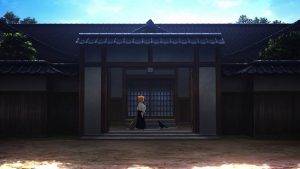 And with that, we have Yuukaku-hen. And it got off to a pretty good start, I have to say – I found this double-episode (how ufotable love their double-episode premieres) quite entertaining. The usual caveats apply – anything with Zenitsu and Inosuke was a chore, and there was way too much crying (again) – but on balance it worked. I’m also noticing as I re-engage with the series that Zenitsu and Inosuke are actually more symptoms than the disease – that being that Kimetsu no Yaiba just isn’t very good at comedy.
And with that, we have Yuukaku-hen. And it got off to a pretty good start, I have to say – I found this double-episode (how ufotable love their double-episode premieres) quite entertaining. The usual caveats apply – anything with Zenitsu and Inosuke was a chore, and there was way too much crying (again) – but on balance it worked. I’m also noticing as I re-engage with the series that Zenitsu and Inosuke are actually more symptoms than the disease – that being that Kimetsu no Yaiba just isn’t very good at comedy.
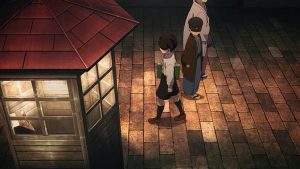 That may not sound like a huge problem for a battle shounen, but Kimetsu compounds it by trying to be funny way too often. There were several times I found myself really getting swept up in the moment (and I recall this happening a lot my first go-around), but every time I did we’d get a lame attempt at comedy that would totally break the spell and spoil the mood. This stuff is obviously working for a lot of people – the series blew pretty much every sales record it was eligible for out of the water and Zenitsu usually wins the character polls. But for me, it’s just KnY shooting itself in the foot.
That may not sound like a huge problem for a battle shounen, but Kimetsu compounds it by trying to be funny way too often. There were several times I found myself really getting swept up in the moment (and I recall this happening a lot my first go-around), but every time I did we’d get a lame attempt at comedy that would totally break the spell and spoil the mood. This stuff is obviously working for a lot of people – the series blew pretty much every sales record it was eligible for out of the water and Zenitsu usually wins the character polls. But for me, it’s just KnY shooting itself in the foot.
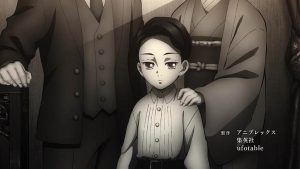 I really want this to work, partly because I long to “get” whatever it is that makes this franchise so massively popular, and partly because there are some elements that I genuinely like. Anything with Muzan is pretty much gold for me – I don’t love most of the performances in the series but Seki Toshihiko gets every element of Muzan just right. His teardown of Akaza was deliciously fun, and enough to make me wish we spent more time with the demons in this cast (especially Muzan himself).
I really want this to work, partly because I long to “get” whatever it is that makes this franchise so massively popular, and partly because there are some elements that I genuinely like. Anything with Muzan is pretty much gold for me – I don’t love most of the performances in the series but Seki Toshihiko gets every element of Muzan just right. His teardown of Akaza was deliciously fun, and enough to make me wish we spent more time with the demons in this cast (especially Muzan himself).
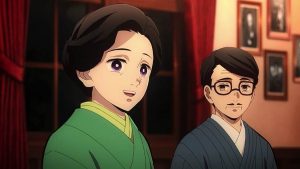 The sequence at the Rengoku house was fine, though it still feels to me that the series is overplaying its hand with the high emotional volume of everything Rengoku-related. This is clearly important from a plot standpoint, however – those Flame Hashira journals that Shinjuro has been doodling in are getting way too much hype, and Shinjuro’s mention of the “Sun Breathing” style (another one of those things I’m not sure whether or not I’m supposed to be aware of) as regards Tanjirou has essential mythology written all over it.
The sequence at the Rengoku house was fine, though it still feels to me that the series is overplaying its hand with the high emotional volume of everything Rengoku-related. This is clearly important from a plot standpoint, however – those Flame Hashira journals that Shinjuro has been doodling in are getting way too much hype, and Shinjuro’s mention of the “Sun Breathing” style (another one of those things I’m not sure whether or not I’m supposed to be aware of) as regards Tanjirou has essential mythology written all over it.
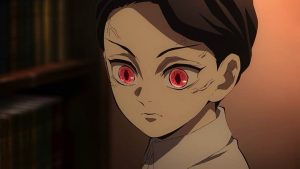 The rest of the double-premiere basically takes place at the “Butterfly Mansion“, where the trio are recuperating after the events of Mugen Ressha-hen. And another character I don’t know but I suspect I should pops up, Tengen Uzui (he cameoed in Mugen Train, but don’t blink). He’s a piece of work, and scores serious brownie points with me by telling Screech to shut up in the omake. He’s also another hashira (or former one), and the one who invites the boys along on the mission to the titular entertainment district.
The rest of the double-premiere basically takes place at the “Butterfly Mansion“, where the trio are recuperating after the events of Mugen Ressha-hen. And another character I don’t know but I suspect I should pops up, Tengen Uzui (he cameoed in Mugen Train, but don’t blink). He’s a piece of work, and scores serious brownie points with me by telling Screech to shut up in the omake. He’s also another hashira (or former one), and the one who invites the boys along on the mission to the titular entertainment district.
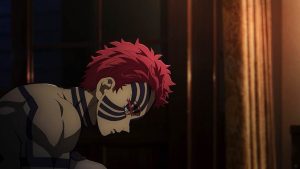 There’s a certain level below which the elements of Kimetsu no Yaiba that drive me nuts don’t cancel out the ones I like. It managed to stay below it in Mugen Ressha-hen, and in this premiere as well. Where things go from here really boils down to that balance, and how well the series manages to strike it – something I can’t possibly predict at this point. All I can say is there’s enough here to make me hope Kimetsu continues to stay on the right side of the line, because I’d like to keep this thought experiment going for a while longer.
There’s a certain level below which the elements of Kimetsu no Yaiba that drive me nuts don’t cancel out the ones I like. It managed to stay below it in Mugen Ressha-hen, and in this premiere as well. Where things go from here really boils down to that balance, and how well the series manages to strike it – something I can’t possibly predict at this point. All I can say is there’s enough here to make me hope Kimetsu continues to stay on the right side of the line, because I’d like to keep this thought experiment going for a while longer.


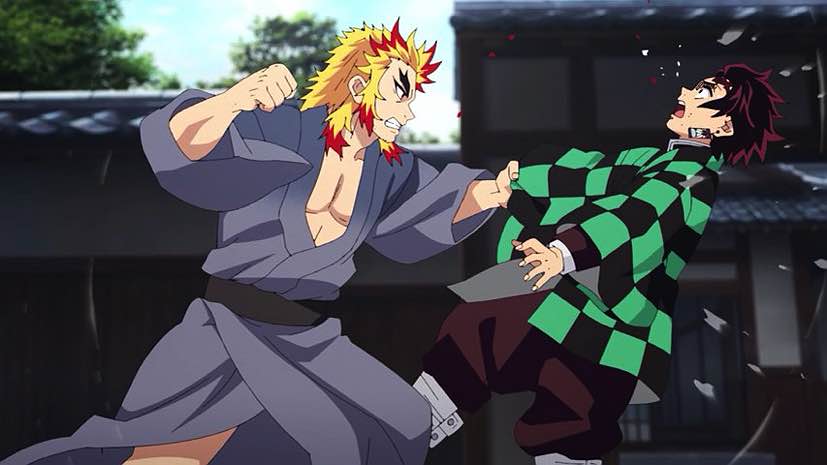
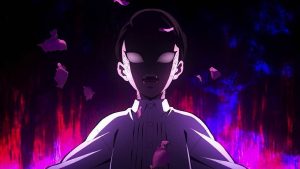
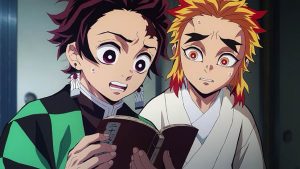
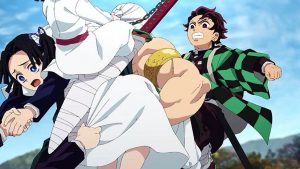

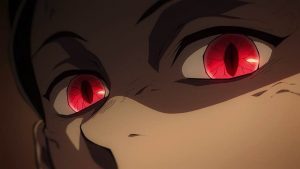
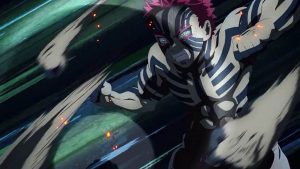
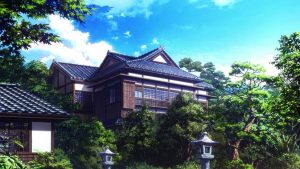
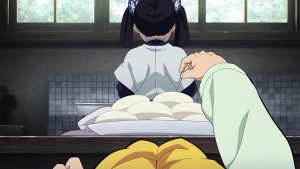
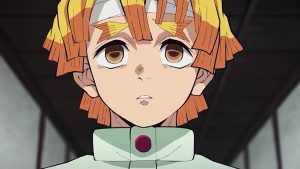
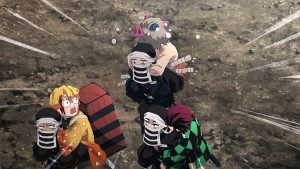
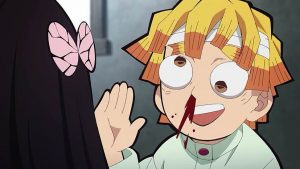
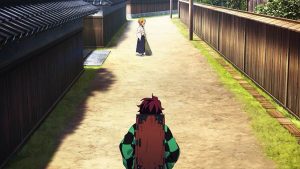
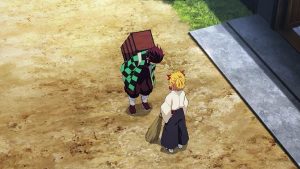
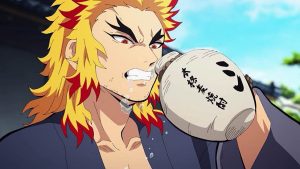
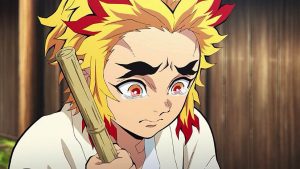
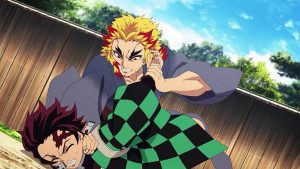
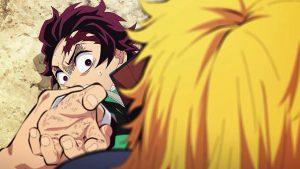
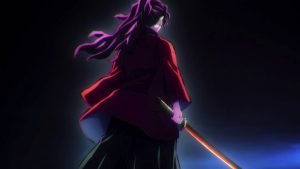
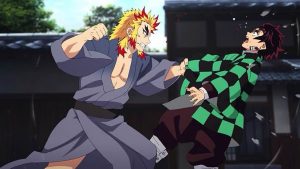
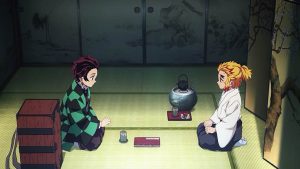
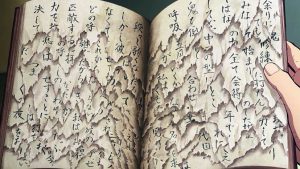
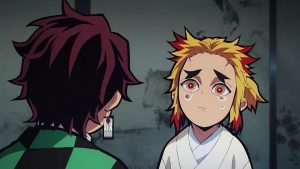
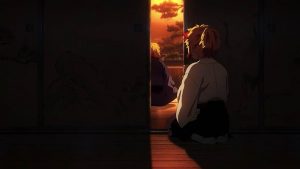
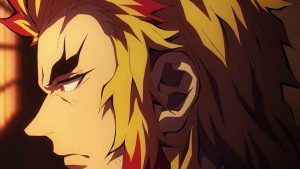
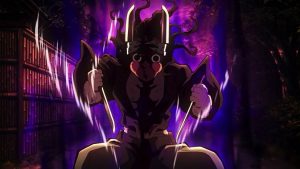
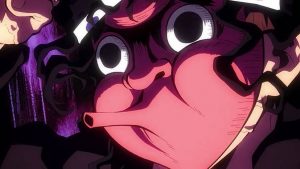
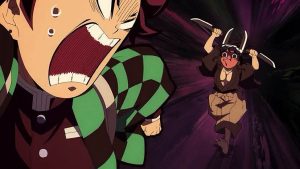
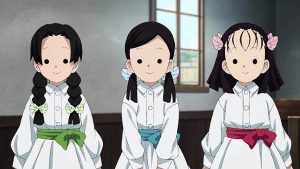
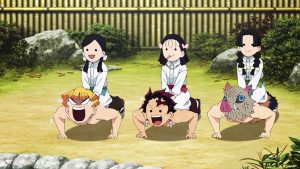
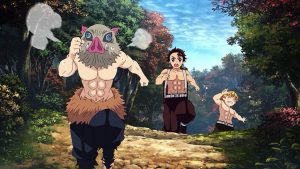
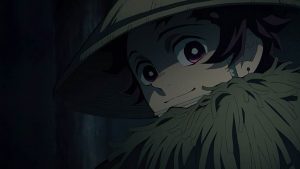
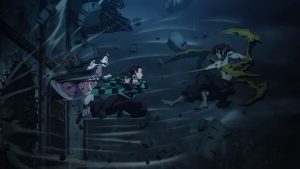
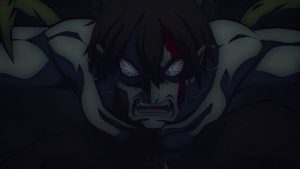
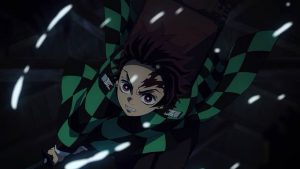
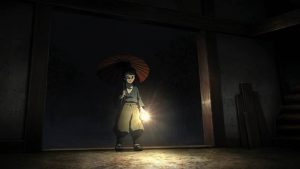
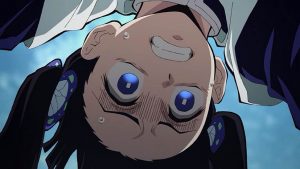
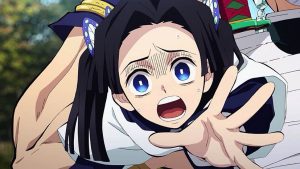
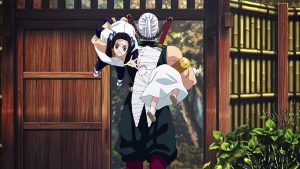
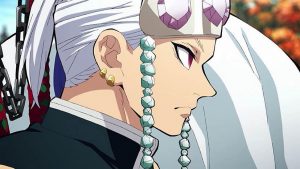
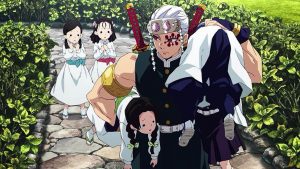
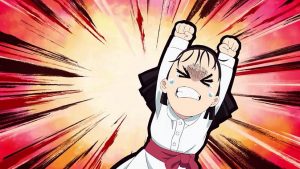
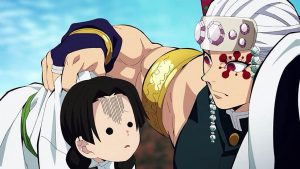
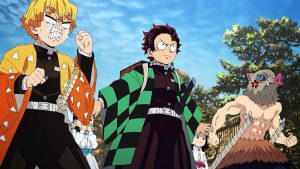
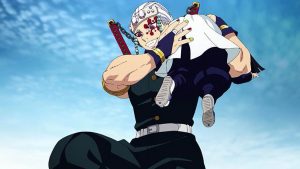
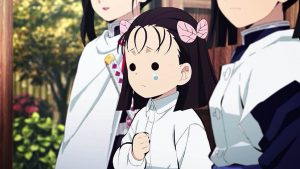
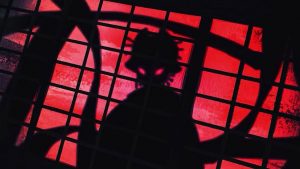
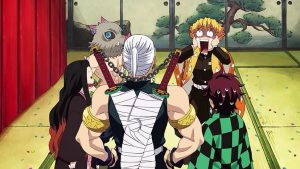
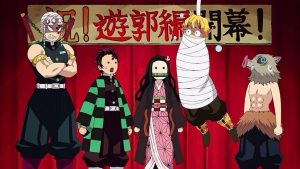
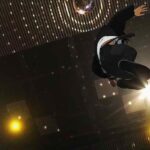

Jindujun93
December 7, 2021 at 10:57 pmRegarding your question on how Muzan ended up being in a young boy’s body, there never is an outright answer to this directly given to the viewers, but the implication very much is that Muzan keeps taking on new appearances to blend into human society unnoticed, similar to how he mimicked being the father of a family when Tanjiro first met him. (There’s also another short appearance by Muzan in the episodes that you skipped over – I think one of the final two episodes of the first season, so that might be of interest for you. Same with Tengen, who was introduced alongside the other pillars in those episodes, but only briefly.)
Guardian Enzo
December 8, 2021 at 7:01 amThank you for that.
Marty
December 8, 2021 at 2:56 amI will argue that though most of the comedy lands on the “miss” rather than “hit” for me, I couldn’t help but laugh at the anger of the Swirdmaker’s frustrations over Tanjiro’s serial destruction of his creations.
Guardian Enzo
December 8, 2021 at 7:02 amHumor is “funny” that way – what works for one person won’t work for another. That had my cursor hovering over the fast-forward button.
Princess Usagi
December 8, 2021 at 9:10 amI agree that KnY is definitely not War and Peace (War and Peace is one of my favorite books of all time). War and Peace has great diversity in the characters it introduces, the deep character development, and even the genres it covered (I always like to say War and Peace has something in it for everyone-historical drama, war epic, romance, character drama). KnY doesn’t really have that diversity. Not to mention the various plot holes or sloppiness that KnY has (like characters all of a sudden using a skill that was never introduced or explained prior and that just so conveniently solves a mortally grave situation). I suppose the popularity of KnY has something to do with taking comfort in the familiar.
I feel that one benefit of the manga over the anime was that I could quickly breeze past the annoying bits with Zenitsu (I really can’t fathom why he is so popular), Inosuke, and the Hottoke sword forger, while with the anime they linger on it too long. However, I do love the beautiful visuals in the anime and sometimes an inspirational line or two can come out of the characters, like Rengoku’s whole quote about keeping one’s passion alive in the midst of tragedy and failure.
As for the sun-breathing, this is the first time it is introduced, so you didn’t miss out on anything.
Marty
December 8, 2021 at 11:07 amCompletely unrelated to the anime, but since u mentioned it, there are a three older films covering the War and Peace Book, are they any good?
Guardian Enzo
December 8, 2021 at 11:11 amI’m not a Tolstoy expert, but I’ve heard the mid-60’s Russian films were pretty good.
Princess Usagi
December 8, 2021 at 12:22 pmI don’t know about the Russian films, but there was an adaptation in the 50’s with Audrey Hepburn, which I found disappointing because it ended half way through the book. There is a more recent mini series from BBC that is quite good.
Guardian Enzo
December 8, 2021 at 11:16 amI guess I don’t quite get the whole Rengoku thing, like – why are we supposed to be so emotional over this guy. To me he’s a very plain vanilla hero figure. And that’s symptomatic of a larger problem I have with KnY, which is its paucity of nuanced characters, especially human ones. Everyone seems to be unabashedly pure and good, pure evil (though that’s mostly youkai), or pure comic relief. Maybe that’s why the demons seem to be more interesting – they’re the villains of the story but you still feel sympathy for them.
Riv
December 8, 2021 at 11:52 amI agree Rengoku is a plain vanilla hero figure, and yet, when I watched the movie, I did feel very emotional over his death at the end, and even cried a bit. I guess there was a lot about his character that appealed to me, even if it was nothing ground breaking or anything. In general, I find the older Hashira to be more interesting than the main trio, and I’ll be interested to see what Tengen is like.
Guardian Enzo
December 8, 2021 at 12:17 pmHis douchiness stands out at least. And he did tell Zenitsu to shut up.
Princess Usagi
December 8, 2021 at 12:36 pmMy guess is that Rengoku is supposed to jerk at the heart strings because he fits into the archetype of the blustering tragic hero who sacrifices all to protect others. Maybe also because he was a good character who died (which goes along with the adage “the good die young”). Although he was not anything new or deep as a character, I was drawn in by his charisma and enthusiasm.
The demons do definitely have interesting back stories. One of my pet peeves with the series is that they wait until the demon’s death to give their backstory. I would have preferred it if they spent more time prior to their death fleshing out the demons’ personal histories, instead of leaving it for an almost afterthought.
Archaon
December 8, 2021 at 5:18 pmI disagree. Most of the information about the demon life were scatter throughout the fight, the conversations and their personality. The flashback basically just to tie up all the details together. Take Rui for example, by the time we get to his flashback we already has a general ideas about who he is and what he want through his actions.
Wangwang
December 8, 2021 at 8:01 pmHave finished the manga, I think i can say that the humor in KnY fit more in the manga than in anime. It doesn’t help that the manga look and feel much brighter (as in both lighting and tone) than the anime, so the humor feel for fitting.
Derrick
December 8, 2021 at 8:59 pmKnY is fulfilling the hole left by Naruto. A competent japan-heavy show with array of colorful, easy to understand characters.
It attract both anime lovers and japan lovers (including those japanese themselves).
I suspect people should copy Naruto, Rurouni Kenshin and KnY in its japanese motifs.
Raikou
December 9, 2021 at 10:04 amI see Rengoku’s death like Sir Nighteye, we just barely know them and few episodes later they bite the dust.
Can’t really felt sad with the death, but I think the dad scene crying in the end was nice.
Guardian Enzo
December 9, 2021 at 10:39 amI felt Nighteye was much more developed, and he had strong connections to one of the main characters. Just MO of course but I felt a lot more when he died (and I don’t especially love that arc, for the record).